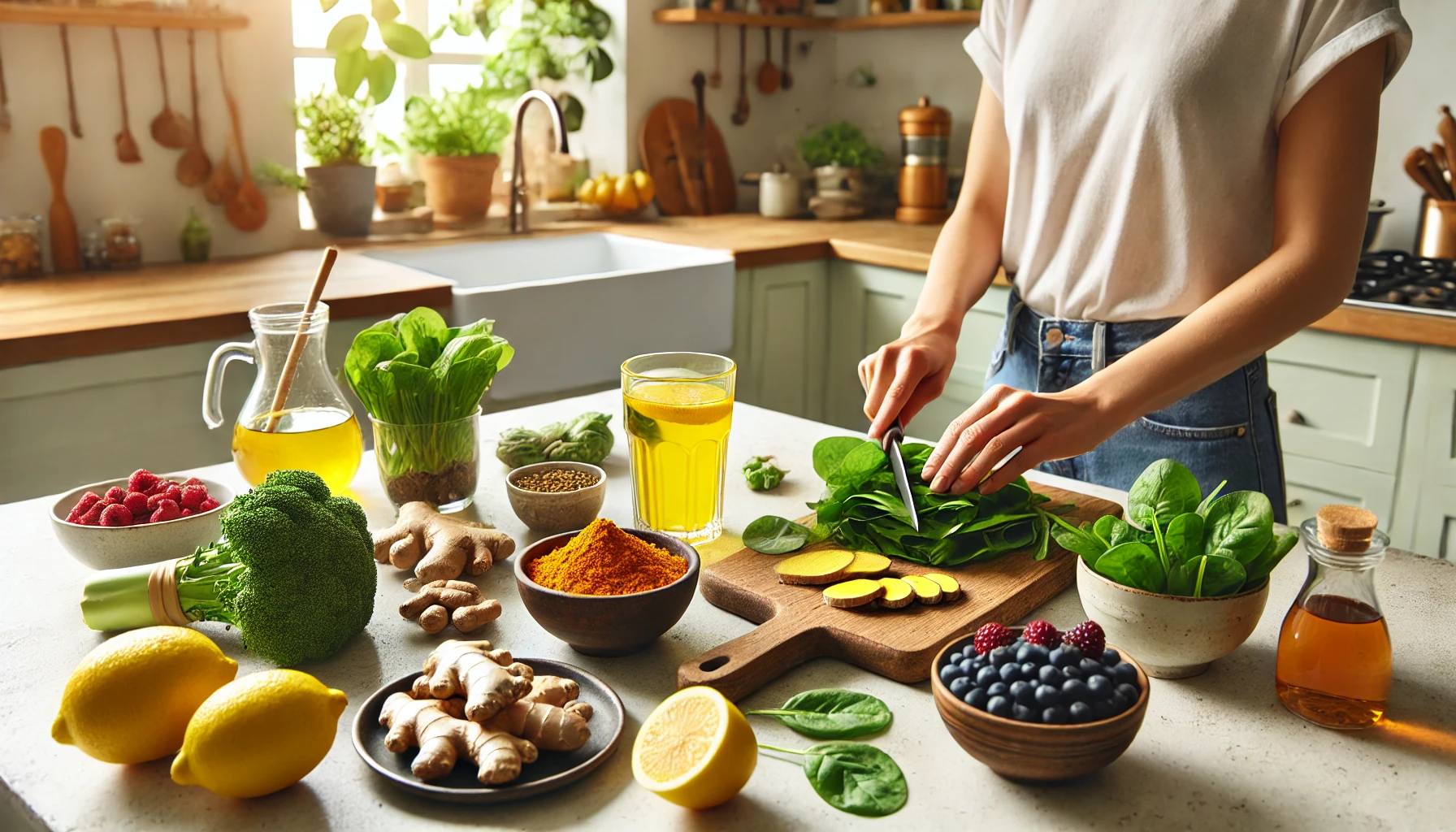Inflammation is the body’s natural response to injury or infection, but chronic inflammation can lead to serious health issues like heart disease, arthritis, and digestive problems. Fortunately, lifestyle changes and diet adjustments can help lower inflammation naturally.
In this article, you’ll learn effective ways to reduce inflammation and improve overall well-being.
1. Eat More Anti-Inflammatory Foods
A nutrient-rich diet can fight inflammation and support your immune system.
Best anti-inflammatory foods:
✔ Leafy greens (spinach, kale, broccoli) – rich in antioxidants.
✔ Berries (blueberries, strawberries, raspberries) – packed with polyphenols.
✔ Fatty fish (salmon, sardines, tuna) – loaded with omega-3s.
✔ Nuts and seeds (almonds, walnuts, flaxseeds) – provide healthy fats.
✔ Turmeric and ginger – contain powerful anti-inflammatory compounds.
Try this: Add one anti-inflammatory food to every meal.
2. Cut Back on Processed Foods and Sugars
Highly processed foods increase inflammation and oxidative stress in the body.
Inflammatory foods to avoid:
❌ Refined carbs (white bread, pasta, pastries).
❌ Sugary drinks (soda, fruit juices with added sugar).
❌ Processed meats (sausages, hot dogs, deli meats).
❌ Fried and fast foods – high in trans fats.
Try this: Replace processed snacks with fresh fruit, nuts, or homemade smoothies.
3. Get Enough Omega-3 Fatty Acids
Omega-3s help reduce inflammation and support brain and heart health.
Best sources of Omega-3s:
✔ Salmon, mackerel, and sardines – excellent natural sources.
✔ Chia seeds and flaxseeds – plant-based alternatives.
✔ Walnuts – packed with healthy fats.
Try this: Eat fatty fish twice a week or add flaxseeds to your smoothies.
4. Stay Hydrated to Flush Out Toxins
Drinking enough water helps the body eliminate toxins that contribute to inflammation.
Best hydrating drinks:
✔ Water – the best natural detoxifier.
✔ Herbal teas (chamomile, ginger, green tea) – reduce inflammation.
✔ Lemon water – supports digestion and alkalizes the body.
Try this: Drink at least 8 glasses of water daily and sip herbal tea for added benefits.
5. Get Quality Sleep to Reduce Inflammation
Poor sleep increases stress hormones and inflammatory markers, making it harder for the body to heal.
How to improve sleep quality:
✔ Stick to a consistent sleep schedule.
✔ Avoid screens at least 1 hour before bed.
✔ Create a calm nighttime routine with relaxation techniques.
Try this: Aim for 7–9 hours of sleep per night to support recovery.
6. Manage Stress Through Relaxation Techniques
Chronic stress triggers inflammatory responses in the body, leading to fatigue and illness.
Best stress-reducing techniques:
✔ Practice deep breathing and meditation.
✔ Engage in gentle movement like yoga or walking.
✔ Spend time in nature to lower stress hormones.
Try this: Dedicate 5 minutes a day to deep breathing exercises.
7. Exercise Regularly, But Avoid Overtraining
Moderate exercise helps reduce inflammation, but overtraining can have the opposite effect.
Best exercises to reduce inflammation:
✔ Walking and hiking – low impact but effective.
✔ Strength training – builds muscle and lowers inflammation.
✔ Yoga and stretching – improves circulation and reduces stress.
Try this: Move your body at least 30 minutes a day, but listen to your limits.
8. Support Gut Health with Probiotics
A healthy gut helps regulate inflammation and strengthens immune function.
Best probiotic foods for gut health:
✔ Yogurt and kefir – packed with beneficial bacteria.
✔ Kimchi and sauerkraut – fermented foods rich in probiotics.
✔ Miso and tempeh – plant-based options.
Try this: Eat at least one probiotic-rich food per day.
9. Reduce Alcohol and Caffeine Intake
Excess alcohol and caffeine can cause inflammation and disrupt sleep.
How to moderate intake:
✔ Limit alcohol to 1–2 drinks per week.
✔ Swap coffee for green tea or herbal alternatives.
✔ Stay hydrated to balance caffeine intake.
Try this: Replace one cup of coffee per day with green tea.
10. Use Natural Herbs and Spices
Certain herbs and spices contain anti-inflammatory compounds that can reduce pain and swelling.
Best anti-inflammatory spices:
✔ Turmeric – contains curcumin, a strong anti-inflammatory agent.
✔ Ginger – reduces inflammation and aids digestion.
✔ Cinnamon – stabilizes blood sugar levels.
Try this: Add turmeric and ginger to smoothies, soups, or teas.
Final Thoughts
Chronic inflammation contributes to many health problems, but small daily changes can help reduce it naturally. By eating anti-inflammatory foods, managing stress, staying active, and sleeping well, you can support your body’s natural healing process.
Which anti-inflammatory habit will you start today? 😊🌿
